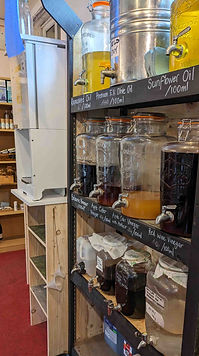
Valuing What We Have
Food Waste - let's reduce it!
Zero Carbon Guildford runs a Community Fridge in Guildford at Unit 1, Riverside Business Park, Walnut Tree Close, GU1 4UG on Tuesdays and Thursdays after 10.30.
People can come and take a share of the ‘surplus’ food that has been collected from local supermarkets bakeries and fareshare. This not only helps the Community but it prevents perfectly good food from being ‘underused’ and either being burnt for fuel, fed to animals or turned into compost and instead makes it available for human consumption.
In its first 3 years, since January 2022, Zero's Community Fridge has collected and given out more than 50 tonnes of food that would've been thrown away.

The total amount of surplus food redistributed for human consumption in 2022 in the UK was around 170,000 tonnes, up from 106,000 tonnes in 2021. 70% of this was distributed via charitable channels. This is one way supermarkets are able to cut down on their food waste - but what about households, what could we be doing to cut our food waste?
.png)
WRAP (Waste & Resources Action Programme) is a British registered charity: their latest research (Nov 23) shows that in 2021 UK households threw away 6.4 million tonnes (Mt) of food and that a huge 4.7 Mt of this (73%) could have been eaten. Of the total food waste arising in the UK in 2021 (ca. 10.7 Mt) 15% was wasted On-farm, 13% Manufacture, 10% Hospitality and Food Sector, 2% Retail, and 60% Household. This shows that as households we are responsible for wasting an awful lot of food.
Total food waste arising in the UK, by sector
Generally not nearly enough of our food waste is put into our food waste bins (only around 60%). Food waste which goes into rubbish bins instead of our food waste bins costs far more to process and is therefore is a waste of the council’s resources which could be spent on other vital services. Also when food waste ends up in landfill it produces methane which is a very potent greenhouse gas that contributes to climate change.

Supermarkets and shops are due to remove packaging from 24 fruits and vegetables by 2025. This should help us to buy only what we need (and also, crucially, cuts down on plastic).
Wasted food isn't just a social or humanitarian concern - it's an environmental one – the land used to produce this ‘wasted’ food could otherwise be forest or natural habitat. Producing the food in the first place involves huge amounts of water and energy and the production of greenhouse gas emissions -
Every 1kg of food waste produces around 2.5kg of additional carbon emissions in production, transport and disposal - see this WWF article on fighting climate change by preventing food waste.
For lots more information and ideas see:
Re-using containers
It would make so much sense to be able to buy the amount of food you need when you need it, and put it into a container which you already own. But instead, until now, the consumer has had to:
-
buy more than they need, so it goes stale before they can use it!
-
buy extra packaging they also don't need even though there is a perfectly good container sitting at home
Well now, thanks to some innovative refill shops appearing locally we can all join the move to cut down on packaging, AND buy the right amount of food that is still fresh and tasty when we come to eat it. All that's needed is remembering to take the empty container to the shops!
.jpg)
For Earth's Sake, our fabulous local refill shop in Upper House Lane - their takeaway spanakopitta is lovely too!

.jpg)
A more sustainable approach to Clothing
Did you know:
-
64% of the 32bn outfits manufactured each year end up in the bin!
-
In 2019 alone 208 MILLION lbs of waste was generated by ‘single use outfits’!
-
20% of the planet’s entire waste water production is from the fashion industry!
-
Cotton uses only 3% of the world’s arable land - but non-organic cotton accounts for 24% of insecticide use!
Maybe if we simply reduce the number of new clothes we buy we could all make a difference to these worrying statistics, reducing the amount of raw materials, water and energy used in clothing manufacture and distribution, and its contribution to landfill.
Pass things on
Passing things on and buying secondhand via on line market places, charity shops or fairs, car boot sales and vintage clothes sales is a great way to ensure they get reused and we don't just waste what we have but no longer want: not only clothes but all sorts of equipment and toys. It can be very sociable too!


Make it last
There are lots of ways to make stuff last longer - this might include either repairing things like this wooly jumper, or transforming items into something different (also known as upcycling) like this clever gate catch made from a horseshoe.

Reuse things, don't throw them away!
and join the SGEG Upcycling Challenge!
We are hoping to build a gallery of bright ideas so if you have any examples of when you have given your items a new lease of life please send us a photo - pics before and after would be great, but often the 'before' pics get forgotten, so send us the 'after' ones anyway!